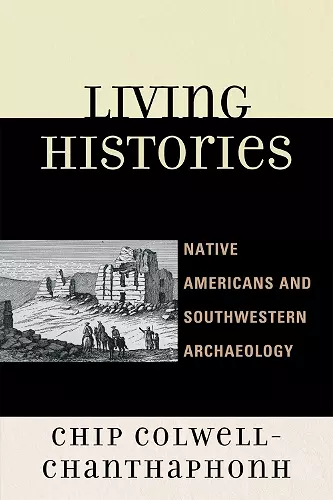Living Histories
Native Americans and Southwestern Archaeology
Chip Colwell-Chanthaphonh author
Format:Hardback
Publisher:AltaMira Press
Published:16th Nov '10
Currently unavailable, and unfortunately no date known when it will be back
This hardback is available in another edition too:
- Paperback£40.00(9780759111967)

This book is about the tangled relationship between Native peoples and archaeologists in the American Southwest. Even as this relationship has become increasingly significant for both "real world" archaeological practice and studies in the history of anthropology, no other single book has synthetically examined how Native Americans have shaped archaeological practice in the Southwest and how archaeological practice has shaped Native American communities. From oral traditions to repatriations to disputes over sacred sites, the next generation of archaeologists (as much as the current generation) needs to grapple with the complex social and political history of the Southwest's Indigenous communities, the values and interests those communities have in their own cultural legacies, and how archaeological science has impacted and continues to impact Indian country.
Rather than reviewing what is known about the ancient Southwest, this book examines how archaeological practices have impacted living communities. Colwell-Chanthaphonh (Denver Museum of Nature and Science) usefully summarizes the alienations and entanglements between mainstream archaeological practices and southwestern Native American understandings of deep history. He concisely outlines how indigenous people historically were barred from the archaeological study of their past, and their recent (yet still incomplete) successes in breaking into the conversation. Colwell-Chanthaphonh consistently tacks back and forth between the perspectives of archaeologists and Native peoples, attempting to keep them "separate but equal." The book treats their divergent approaches to the value of the past and sites, the history of archaeological research, and federal laws governing indigenous heritage. Coverage of Native participation in and resistance to early excavations, the emergence of tribal-run heritage programs, and recent collaborative efforts between indigenous people and mainstream archaeologists is particularly strong. The volume, written for nonspecialists, will also be a great addition to introductory courses in southwestern and North American archaeology. Summing Up: Highly recommended. * Choice Reviews *
The general reader and archaeology student will find this book enjoyable and enlightening. . . . Several of the sidebars present specific topics that would make good class discussions at either the undergraduate or graduate level. Given the history it provides and the discussions it will provoke, this book should be required reading in all university survey courses on Southwest archaeology. * Journal of Anthropological Research *
Colwell-Chanthaphonh has provided an alternative way of presenting the “histories” of the American Southwest. Rather than relegating Native American communities to the periphery or injecting them firmly into the middle, he draws attention to their place within archaeology’s development, growth, evolution, and change. What [Colwell-Chanthaphonh] has created. . . is an introductory volume that all archaeologists—Southwestern and non-Southwestern practitioners alike—should read and take note of. * Current Anthropology *
In this book, Chip Colwell-Chanthaphonh succeeds admirably in writing Native Americans back into the history of Southwestern archaeology. Living Histories is essential reading for anyone with an interest in the anthropology, archaeology, and history of the Southwest, and should be read alongside any of the standard textbooks on these topics. It is an indispensable contribution to the history of Southwestern archaeology. -- Matthew Liebmann, Harvard University
An eloquent, timely, and provocative addition to the literature. Colwell-Chanthaphonh charts a new path for Southwestern Archaeology, pointing the way to sustainable practices that value not just sites but people, relationships, and the 'living histories' that we all inhabit. -- Wesley Bernardini, University of Redlands
ISBN: 9780759111950
Dimensions: 240mm x 162mm x 18mm
Weight: 465g
212 pages